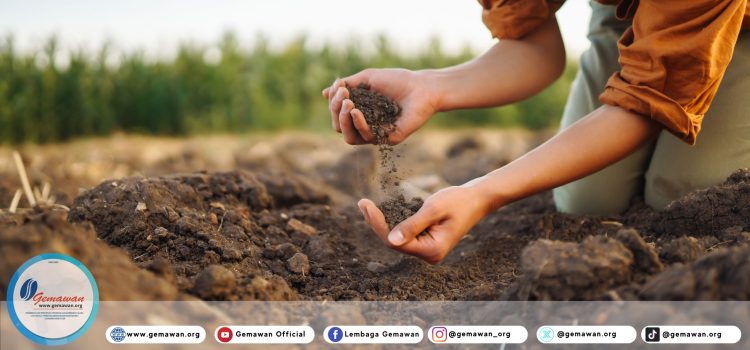
West Kalimantan is known for its abundant natural wealth—from tropical forests to fertile agricultural lands that sustain the livelihoods of its people. Yet behind this immense potential lies a stark reality: the agricultural sector, particularly food crops, faces serious challenges.
Farmers, the backbone of food security, are caught in a vulnerable position—squeezed between economic hardship, unequal access to technology and capital, and mounting pressure from the rapid expansion of palm oil plantations.
In this context, Gemawan has undertaken a series of initiatives that position farmers as key agents of change. Through commodity assessments, strengthening of farmers’ organizations, and policy advocacy, Gemawan strives to build an agricultural ecosystem that is resilient, inclusive, and sustainable.
Commodity Assessment: The First Step Toward an Empowered Farming Ecosystem
In January 2024, Gemawan launched an agricultural commodity assessment in six regencies and cities across West Kalimantan—Sambas, Singkawang, Mempawah, Sintang, Melawi, and Kubu Raya.
The goal was to identify potential leading commodities that could be further developed by farming communities to strengthen the economic independence of rural areas.
According to Heru Suprihartanto, Gemawan’s Program Manager, the assessment serves as a foundation for strengthening inter-farmer networks.
“The results of this assessment will form the basis for building stronger relationships among farmers cultivating similar commodities. By developing collective networks, they can reach larger markets at greater scale,” he explained.
The commodities assessed include rice, bananas, coconuts, tubers, pineapples, coffee, and areca nuts—all of which have long supported the local economy. Heru emphasized that the list remains open to new opportunities that arise from innovation and shifting market dynamics.
“There may be other commodities with promising market prospects that have not yet been recorded. That’s why we hope this process will lead to broader networks and commodity clusters,” he added.
Beyond mapping, the assessment highlights the importance of encouraging farmers to organize themselves collectively.
Until now, most farmers have sold their harvests individually to middlemen, leading to weak bargaining power and unfair prices. Through cooperatives or farmer unions, they can consolidate their produce and sell directly to larger buyers or markets, bypassing intermediaries.
“Imagine if 100 farmers each produced 500 kilograms of harvest—that’s 50 tons combined. With that volume, they could reach major buyers without relying on middlemen,” Heru illustrated.
For Gemawan, organizing farmers collectively is key to transforming the village economy—from individual dependence to collective strength.
The Crisis of Food Crop Farmers in West Kalimantan
Although the agricultural sector contributes over 20% to West Kalimantan’s Gross Regional Domestic Product (GRDP), food crop farmers remain among the most vulnerable groups.
The 2023 Agricultural Census shows that more than 50% of farm managers are over 45 years old. This “aging farmer” phenomenon poses a serious threat to agricultural regeneration.
Younger generations are reluctant to work in farming due to limited access to land, capital, and stable pricing guarantees.
Only 20% of farmers have adopted modern agricultural technologies. The majority still rely on traditional methods without efficient irrigation or mechanization. Meanwhile, government aid programs often fail to reach smallholder farmers in rural areas.
This crisis is compounded by the impacts of climate change. Erratic rainfall, droughts, floods, and forest fires have drastically reduced yields. Rice farmers in wetland and coastal areas have lost land to seawater intrusion and coastal erosion.
Under these conditions, local food security is under threat, and many farming families are slipping deeper into poverty.
“The climate crisis and policy failures have eroded farmers’ resilience. They stand on the front lines, yet receive the least protection,” said Muhammad Yamin Adysa Putra, a social activist.
Palm Oil Plantations and the Threat to Food Security
On the other hand, palm oil plantations dominate West Kalimantan’s agricultural landscape, covering around 77% of the province’s total plantation area.
Palm oil contributes significantly to the national economy through crude palm oil (CPO) exports and provides jobs across plantation and processing sectors.
However, this economic success comes at a cost.
Large-scale palm oil expansion has led to deforestation, land conflicts, and the loss of clean water sources. Many food crop areas have been converted into palm plantations, reducing local food production and increasing dependency on food imports from other regions.
Socially, land conversion has transformed rural economies.
Farmers who once cultivated rice for household consumption now grow palm oil—a crop that cannot feed their families directly. Dependence on volatile global markets has deepened, and when CPO prices fall, rural economies collapse.
Gemawan argues that food crop agriculture offers deeper long-term value than palm oil monoculture.
While palm oil may yield short-term financial gain, food agriculture sustains social and ecological resilience for future generations.
Balancing Economy, Ecology, and Farmer Regeneration
True food security is not merely about having rice on the market shelves—it’s about ensuring smallholders can sustain their livelihoods on their own land.
That’s why Gemawan promotes local food diversification and strengthening farmer institutions.
This approach includes:
-
Adopting environmentally friendly technologies: such as zero-burning farming, water-efficient irrigation systems, and digital innovations for managing production and distribution.
-
Regenerating young farmers: through education, training, and access to affordable capital.
-
Implementing affirmative local policies: to protect sustainable food lands and prevent the rapid conversion of agricultural areas.
With these measures, agriculture can serve not only as an economic driver but also as a safeguard for ecological balance and community food sovereignty.
The Path Toward Food Independence and Justice
West Kalimantan’s agricultural landscape presents two realities:
one striving to defend food-producing lands for community resilience,
and another driven by the global export economy.
Bridging these two demands requires a clear political commitment to smallholder farmers.
Gemawan believes the future of agriculture lies in the hands of communities that are organized, innovative, and sovereign over their own resources.
With fair policies, cross-sector collaboration, and strengthened grassroots capacity, food sovereignty in West Kalimantan is not just an aspiration—but an achievable reality.
Author: Mohammad R., Gemawan Activist
